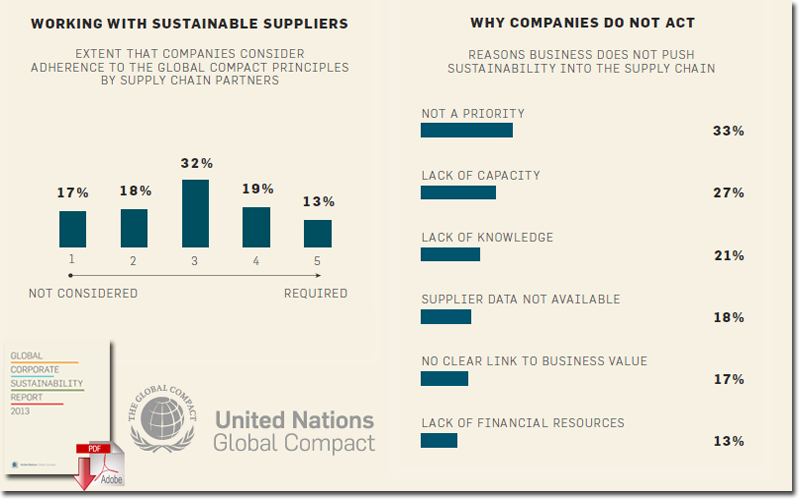Companies Shifting from Commitment to Action in the Drive Towards a Sustainable Future
Based on responses to the Global Compact Annual Implementation Survey, the report provides a robust view on how businesses everywhere, and of all sizes, are adjusting their policies and practices to address today's sustainability agenda.
The United Nations Global Compact released its flagship Global Corporate Sustainability Report 2013.
Based on survey responses from nearly 2,000 companies across 113 countries, the report provides a snapshot of the actions taken by business to embed responsible practices into their strategies, operations and culture.
Findings show that companies committed to the UN Global Compact – the world’s largest corporate sustainability initiative – are moving from good intentions to significant actions.
Companies indicate that they see the big picture of how addressing sustainability issues – from human rights, labour, environment and anti-corruption, to broader societal goals such as education, poverty and health – is good both for business and the societies in which they have a presence.
However, while progress is being made, there is a long journey ahead for companies to fully embed responsible practices across their organizations and supply chain.
Following are key findings:
- There is a clear gap between what companies “say” and what they “do”. Companies are making commitments, defining goals and setting policies at high rates, but still have much work to do to on the action steps. For example, 65 percent of respondents develop sustainability policies at the CEO level, while only 35 percent train managers to integrate sustainability into strategies and operations.
- Size is the most significant factor in sustainability performance. While small and large companies are committing to the UN Global Compact in equal numbers, large companies are significantly more likely to move beyond commitment to action across all issue areas. However, the survey has uncovered an encouraging development: smaller companies are increasingly taking steps to catch up to their larger peers.
- Supply chains are a roadblock to improved performance. Supplier sustainability ranks as the top barrier for large companies in their advancement to the next level of sustainability performance. While a majority of companies have established sustainability expectations for their suppliers, they are challenged to track compliance and help suppliers reach goals, for example.
- Everyone benefits from a better world. Seventy percent of Global Compact companies are advancing broad UN goals and issues, by aligning their core business strategy, tying social investment to core competencies, advocating the need for action, and implementing partnership projects.
“While corporate leaders recognize the importance of global sustainability issues, there are still many challenges to be met,” said Georg Kell, Executive Director of the UN Global Compact.
“Companies must put words into action—by implementing policies, measuring their effectiveness and reporting their progress publicly. The Global Corporate Sustainability Report 2013 provides a resource on sustainability for Boards of Directors, business leaders and sustainability officers as they lead their organizations to a sustainable future.”
The UN Global Compact combines the universally accepted principles and convening power of the United Nations with the private sector’s solution-finding strengths. Through the initiative, over 8,000 businesses based in 145 countries are driving the discussion on corporate sustainability, and momentum continues to build as companies look for ways to align their actions with global development priorities.
Supply Chains Are a Roadblock to Improved Sustainability Performance
Supply chains are an extension of a company’s reputation, but not its corporate sustainability strategy
While a majority of companies have established sustainability expectations for their suppliers, they are not tracking compliance or helping suppliers reach the desired goals.
The sustainability performance of suppliers and vendor partners–whether they are providing raw materials, transporting finished products or conducting third-party risk analyses of company processes–all contribute to a company’s true sustainability status.
At this point in time, while few Global Compact signatories are fully encompassing their supply chain partners in their pursuit of sustainability and adherence to the Ten Principles, the large majority are taking the broader view and doing something to include suppliers in their efforts.
Making sustainability a requirement in the supply chain is not an easy or straight-forward process given the work often needed to sensitize, remediate and then accelerate practices by suppliers–especially for large companies that deal with thousands of vendors.
In fact, when asked to rank the factors slowing or blocking advancement to the next level of sustainability performance, large companies put “extending corporate sustainability strategies through the supply chain” at the top of the list (54%). For SMEs it ranked third, at 26%, behind lack of financial resources and lack of sustainability knowledge.
Still, despite these roadblocks, companies are forging ahead to push sustainability into the supply chain.
Since 2008, the percentage of companies that require supplier adherence to Global Compact principles has nearly doubled to 13%, while the number that do not take the principles into consideration has dropped from 32% to 17%.
Download the Report: Global Corporate Sustainability Report 2013














